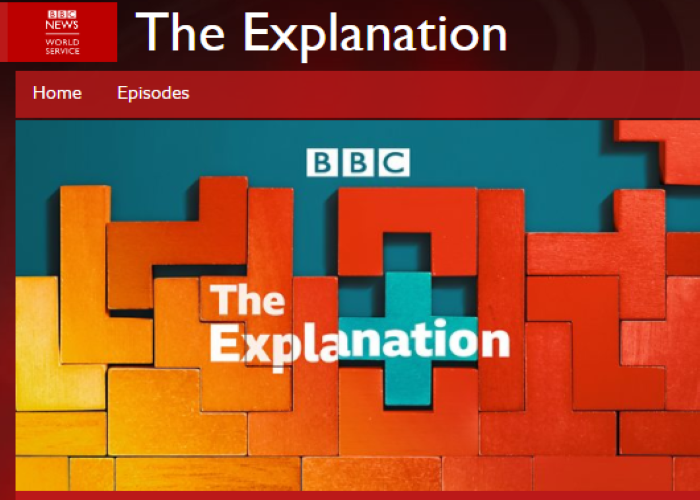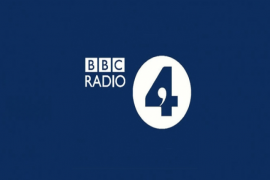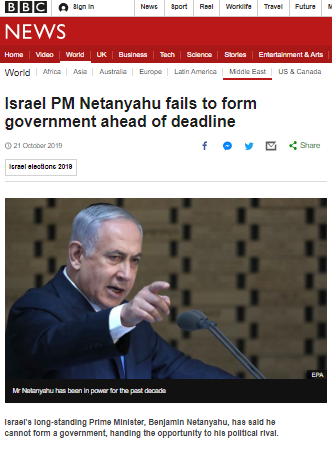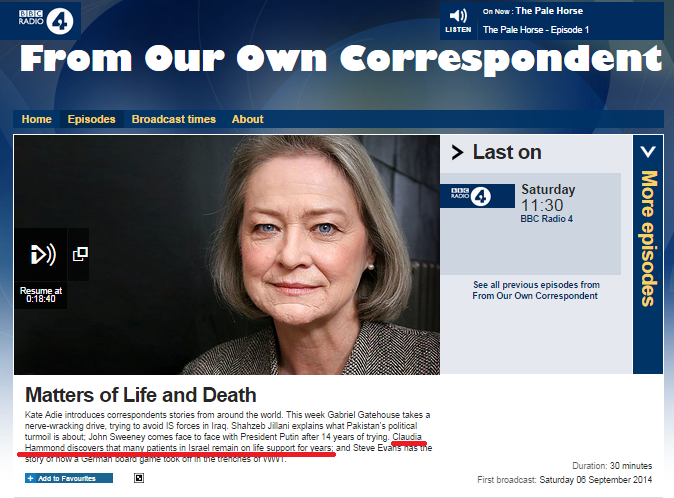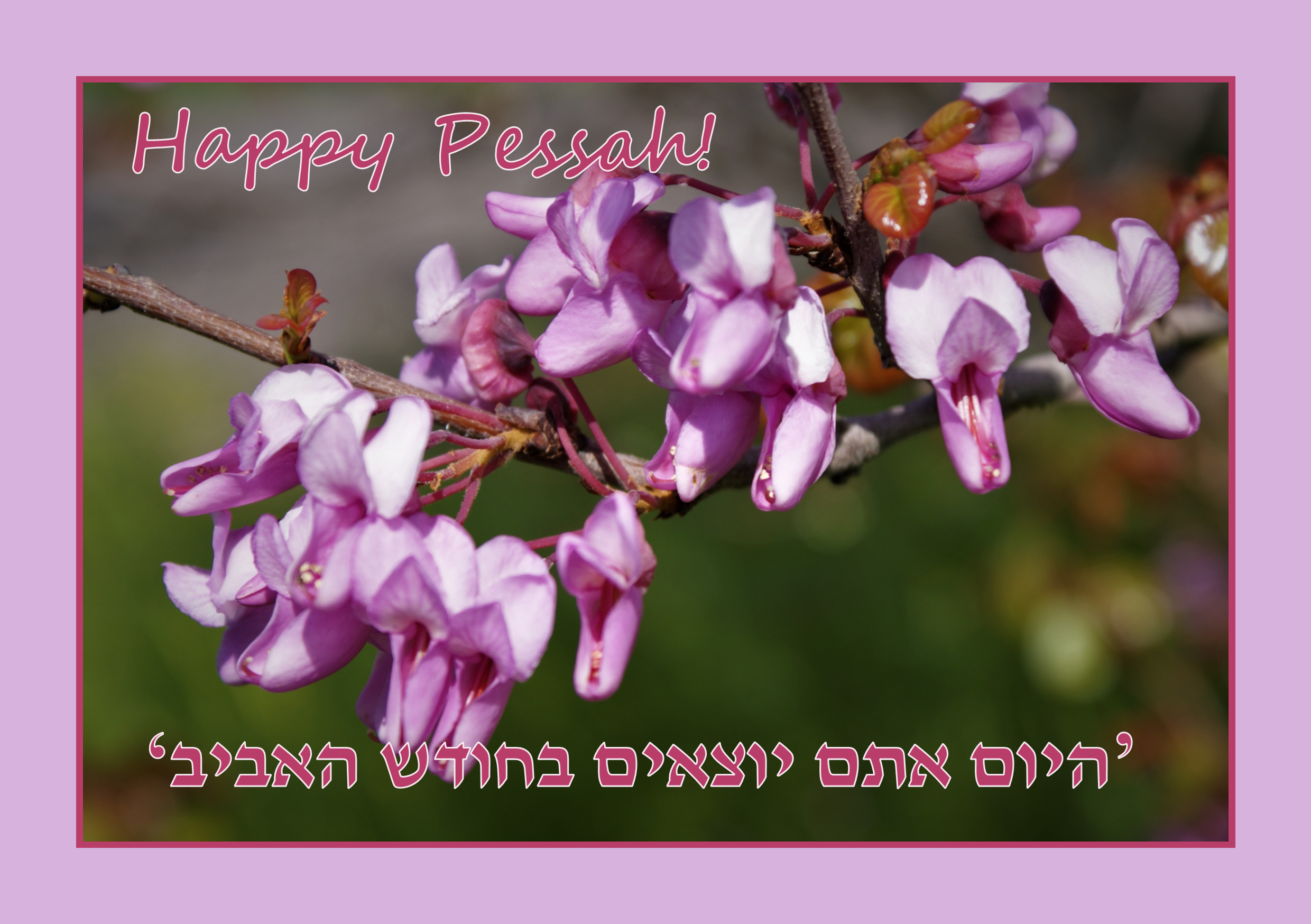BBC World Service radio programming currently includes a series called ‘The Explanation’ which is described as follows:
“The Explanation is a snackable audio guide giving you the backstory behind the headlines. In each episode, presenter Anu Anand meets a BBC News correspondent who has lived and breathed these stories. She’ll hear clear analysis along with powerful archive. The Explanation will go back in time to unpack complex chains of events and will make the stories in question much easier to understand.”
In her introduction to the November 27th edition of that programme, Anu Anand reinforced that messaging: [emphasis in italics in the original, emphasis in bold added]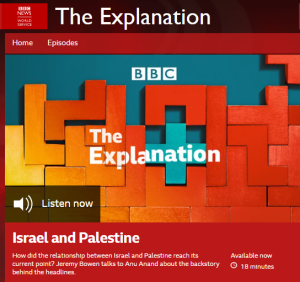
Anand: “Being an informed citizen is not always easy. You want to know what’s going on to stay up to date with the big news stories that affect your fellow humans across the planet. But the non-stop deluge of important events makes it difficult to completely understand the headlines and that’s where we hope ‘The Explanation’ from the BBC World Service can help. I’m Anu Anand. I’m going to ask some of my BBC colleagues to help me break down big global stories using archive recordings made on the ground to make sense of why these stories are important.”
While that may sound like a worthy aspiration, in this particular episode at least, Anand missed her target by creating a programme replete with factual errors and crucial omissions, while advancing long-existing BBC narratives on a topic presented as “Israel and Palestine” even though the BBC long since acknowledged that no independent state called Palestine currently exists.
“How did the relationship between Israel and Palestine reach its current point? Jeremy Bowen talks to Anu Anand about the backstory behind the headlines.”
Listeners first hear an archive recording in which Jeremy Bowen says “There were always fears that Friday prayers here would end in bloodshed”. Like the rest of the numerous archive recordings in the programme, no date or context is provided, meaning that rather than being “powerful”, it actually contributes nothing to listener understanding of the topic.
Anand: “Today we delve into relations between Israelis and Palestinians with the BBC’s Jeremy Bowen. This is ‘The Explanation’ from the BBC World Service.”
Bowen: “One of the reasons I think why people become journalists and foreign correspondents is that you feel that you get a chance to see history unfolding.”
Another context-free archive recording of Jeremy Bowen saying “This has been a day for burying the dead and worrying where and when the next bomb will come” is then heard.
Bowen: “Sometimes it’s not good history.”
In yet another undated, unexplained archive recording Bowen is heard saying: “The bomb exploded on the same street, on the same bus route, at almost the same time as last week”.
Bowen: “But it’s….you…you feel almost like you’re in the cockpit of the world.”
Anand: “Sadly not a year goes by without clashes between Israel and the Palestinians making news. At its heart, the conflict is about land and who has rights to it. Over the next 15 minutes we’ll hear what forces have shaped this fight and why peace feels so elusive. Jeremy Bowen has been covering the Middle East for the BBC since the 1990s.”
Clearly any attempt to explain the Arab-Israeli conflict or the Palestinian-Israeli sub-conflict in 15 minutes is grossly pretentious and at best superficial by necessity. The decision to rely solely on one BBC employee, Jeremy Bowen, whose impartiality on the topic has been repeatedly called into question, obviously does not enhance the programme’s chances of achieving its declared aim. In fact, from the very beginning, listeners hear stories that are clearly intended to advance a specific narrative concerning ‘indigenous’ Palestinians.
Following another archive recording from Bowen, Anand tells listeners that in 1995 he rented a house in Ein Kerem, near Jerusalem, for which she uses the Arabic pronunciation – adding that it was a place “from where Palestinians had been displaced decades earlier”. That story involves a type of cactus that is not native to the region.
Bowen: “In the garden there was a big Prickly Pear – big cactuses. They were used traditionally by Palestinian farmers as fences. They’re covered in nasty prickles but they produce a fruit. Now one morning I saw an elderly lady wearing an embroidered Palestinian dress at the bottom of the garden gathering these…the Prickly Pear. Essentially what she said was that she’d always come to gather Prickly Pears in the village because she was from the village and I think she also felt that the fruit was theirs.”
Anand reinforces that framing, going on to promote a debatable claim about a French emperor.
Anand: “His story really stays with me because it illustrates the emotional connection that people have to their land, generation after generation. Now in my research I discovered that as far back as 1799 Napoleon Bonaparte had offered Palestine as a homeland for the Jewish people. But the story of the tussle between Jews and Palestinians begins in earnest in 1897.”
Bowen: “In 1897 there was an event called the World Zionist Congress and it was organised by a Jewish writer Theodor Herzl. And what happened at that event in his words was that he invented the Jewish state.”
Listeners hear nothing at all about the ancient history of Jews in what later became known as Palestine or that they continued to inhabit the region for thousands of years. The fact that the word Zion is a synonym for Jerusalem is absent from Anand’s explanation of Zionism and she erases the connection of Jews to the land that is part of their identity, with or without Zionism.
Anand: “Now a Zionist is someone who supports the creation of a Jewish nation in Palestine. The word comes from one of the hills of ancient Jerusalem called Zion. Herzl and the congress invited more than 200 delegates to Basel, Switzerland and held a symbolic parliament – a chance for Jews to express their determination for nationhood.”
Listeners then hear another narrative advancing but highly dubious story which Bowen has promoted in the past.
Bowen: “After the conference…ahm…some European Rabbis went to Palestine, which was then part of the Ottoman Empire, to see the territory which at that time…it was still being debated but was a potential site for a Jewish state. And they sent back a telegram and they said the bride is beautiful but she’s married to somebody else. In other words, the land is great but hang on, there are people here.”
In other words, in the opening minutes of this programme, Bowen and Anand have erased Jewish connections to the land but twice highlighted those of non-Jewish inhabitants.
Listeners then hear some problematic history:
Anand: “So Jeremy, what is the key event in 1917 that brings the British into this whole conflict?”
Bowen: “In 1917 British Empire forces led by General Allenby captured Jerusalem – they captured Palestine – and he entered the Old City. Back in the UK, in London, notable British Jews had been pressuring the British government to declare that it would be a site for a future Jewish state. They issued a statement which became known as the Balfour Declaration where they declared that the British authorities would look with favour on establishing a homeland for Jews in that territory. Now within that there was a built-in contradiction because it said it was without prejudice to the rights of people already living there. They didn’t say Arabs or Palestinians or anything like that. As things turned out, you couldn’t really have one without the other happening.”
While Allenby did indeed capture Jerusalem in December 1917, as we have previously had cause to note in relation to Bowen’s portrayals of those events, British forces did not complete their First World War ‘Sinai and Palestine Campaign’ until October 30th 1918 – almost a year after the Balfour Declaration was issued.
Bowen’s predictable portrayal of the Balfour Declaration fails to clarify that the part referring to what he describes as “the rights of people already living there” actually specifies “civil and religious rights” rather than political rights.
Ignoring decades of Jewish immigration to Palestine, the Mandate for Palestine and the fact that the League of Nations had assigned the territory to the creation of a Jewish national home, Anand goes on to distort history yet again:
Anand: “The World Zionist Congress and the Balfour Declaration started a movement. In the 1930s and 40s Zionists began moving to Palestine.”
Following an undated archive recording, listeners hear Bowen’s whitewashed account of the Arab Revolt.
Bowen: “From early on conflicts between the two communities turned violent and some of those are still historically controversial and both sides blame each other as they have done, you know, consistently for a century or more. In the 1930s there was a full-on…ahm…Arab uprising. The British responded to that with all the tools that they used in colonial imperial rule: with legal executions summary executions and, you know, a fierce use of force.”
Anand: “Towards the end of World War Two, the Nazi Holocaust shocked the world. An estimated 6 million Jews were systematically murdered by Adolf Hitler’s regime across Europe, greatly increasing support for Jewish refugees. Even so, their influx into Palestine began to cause a new conflict.”
Listeners then hear a biased and context free archive recording:
Archive recording: “With the refugee problem of Hitler’s Europe still an unhappy and recent memory, another of the same kind has been building up in Palestine, where nearly a million harmless Arab villagers have been made homeless as a result of war in the Holy Land.”
As regular readers will be aware, BBC portrayal of the 1947 Partition Plan has long been highly problematic and Anand’s presentation is no better. Contrary to her claim, Jerusalem was not defined as a “shared capital” under that proposal.
Anand: “In 1947 Britain took the problem to the United Nations, which came up with the two-state solution with land for Israelis and land for Palestinians and a shared capital in Jerusalem run by the international community. But the plan was rejected by Arab leaders. In 1948 Britain withdrew.”
Listeners hear nothing about the Arab initiated violence that followed the Arab rejection of the Partition Plan and they are not told that the proposal was accepted by the Jews.
Bowen: “David Ben Gurion, the first founding prime minister of Israel and the leader of the Zionist movement at that time, declared Israel’s independence in Tel Aviv in 1948.”
Following a recording of Ben Gurion speaking, listeners hear a context-free account that erases the invasion of Israel by five Arab countries.
Anand: “Within hours of declaring its independence, Israel was at war.”
An unexplained archive recording of shooting in Jerusalem is followed by portrayals from Bowen and Anand which erase the Jordanian occupation of parts of Jerusalem and Judea and Samaria and the Egyptian occupation of the Gaza Strip, while failing to clarify that “the UN plan” of 1947 was rendered null and void by the Arab refusal to accept it and that the territory left in Israeli hands at the end of the War of Independence was less than that assigned to the creation of a Jewish homeland by the League of Nations.
Bowen: “It was a tough fight for the Israeli side and there were times when they might have lost but they were absolutely determined and of course in the years after the Holocaust, there were people fighting there who’d come in from Europe as well as native born. In the end it was a comprehensive victory for the Israeli side and a defeat that sent the Arab world into a tailspin for decades.”
Anand: “The new state of Israel had not only expelled invading Arab countries; it had captured much more territory than was mandated by the UN plan.”
Bowen: “For Palestinians it was…well they call it the catastrophe, the Nakba. Estimates vary; some of the most reliable are around three quarters of a million Palestinians were forced out of their homes. For Palestinians the events of 1948 destroyed their society. This was not some kind of a desert that the Israelis made bloom. It was the fertile coastal strip. It was a place where people lived.”
Bowen’s partial portrayal of “Palestinians…forced out of their homes” of course comes nowhere near to telling the whole story and listeners hear nothing about the ethnic cleansing of Jews from parts of Jerusalem and Judea & Samaria or the relevant topic of Jewish refugees from Arab and Muslim lands.
In part two of this post we will discuss the second half of this programme and its presentation of events after the establishment of Israel.
Related Articles:
BBC ME EDITOR GIVES CONTEXT-FREE, OMISSION RICH POTTED HISTORY OF ISRAEL’S CREATION
WHERE DID JEREMY BOWEN LEARN THE HISTORY OF THE ARAB-ISRAELI CONFLICT?
BBC COMPLAINTS DEFENDS BOWEN’S INACCURATE HISTORY
BACKGROUNDER: PALESTINIAN ARAB AND JEWISH REFUGEES
REVIEWING BBC PORTRAYAL OF THE 1947 PARTITION PLAN
WHY DOES THE BBC TRUST’S ESC PRETEND THAT THE 1947 PARTITION PLAN IS A THING?

